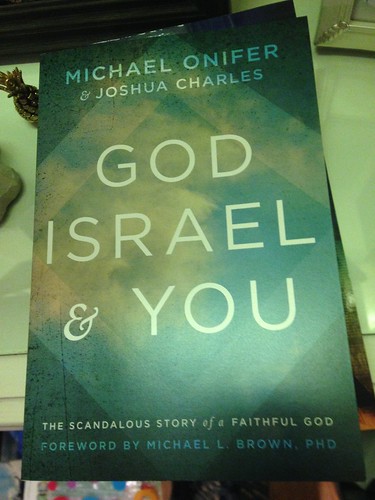
Loving the Arab and the Israeli
A Loving Understanding of the Middle East's Peoples
Two narratives exist today in Christendom about the Middle-East. Depending on your church affiliation, you may hear one or the other. If you attend a mainline Presbyterian Church, say in the PCUSA, you are likely to hear a narrative such as this: “The poor Palestinians have been oppressed by the Jewish ‘occupiers’ of their homeland.” In that point of view, the Palestinians are the victims, the state of Israel is a ‘modern invention’ and has nothing to do with the work of God today. Visit a more Evangelical branch of the church and you may find what seems quite the opposite, a devotion to the modern state of Israel as fulfillment of Prophecy. In this scenario the Arab population often seems to be portrayed as the villain. So, you ask, “Who is ‘right?’” Michael Onifer and Joshua Charles take on this complex and often confusing question in their book: God, Israel and You.[1.] Rather than present a pre-selected narrative and plug in Scripture to affirm it, the authors approach the subject with a very open study of history and Scripture, acknowledging the warts and wrinkles. You will emerge from this book loving the Arab people. You will emerge from this book loving the Jew.
The authors ask the question “Is there anything special about the Jewish Nation?” They reference the promise God made to Abraham that through him all the nations of the earth should be blessed. They point out the significance of the covenant God made with Abraham where God passed through the split animals twice, thus taking upon Himself the entire responsibility for the covenant. Indeed the descendants of Abraham have blessed the world in many ways. The authors point out the foundations of Western Civilization found in the Law of Moses and in modern Israeli innovation and invention. They did their own research, visiting Israel’s Jewish and Arab communities. Their conclusion is that Israel, while far from perfect, has proven to be a blessing to both communities, just as Scripture says they would. To the Arab, the authors visit the story of Hagar in Genesis 16. Read Genesis 16:7-13 and it sounds like a curse. But taken in context and in the original meaning, it is not so. The name Ishmael itself means “God has Heard.” (Like the name Samuel). The promise starts out that he will be fruitful and have many offspring. Then it seems to say that he will be a ‘wild donkey’ and fight with everyone. Here the authors unpack the original Hebrew and that word ‘against or opposed to’ is better contextualized as ‘be close to.’ This was confirmed by blind translation performed by secular Hebrew scholars. [page 139] It makes a whole lot more sense when you see Ishmael and Isaac come together to bury their father. It really makes sense if they dwelled ‘close together.’ The authors also point out that you should think of the ‘wild donkey’ more as you do ‘wild strawberries’ or ‘wild grapes.’ – Breeding stock that was prized because it brought out sturdiness and great original characteristics.
Now if you look at the promises of fruitfulness and greatness given to Isaac and Ishmael, they are remarkably similar. The authors have spent much time in both Arab and Jewish communities and paint a truthful and beautiful picture of both. Their conclusion is much the same as a gentleman in the Israeli Defense Force who I have corresponded with. He is quick to denounce those who come to him to rant about Arabs because he defends the borders of Israel alongside Arab citizens of Israel who also serve in the IDF. When freed from bad political ideology, Arabs and Jews work well together. In fact, during the times when the Christian Church engaged in vicious persecution of the Jews, it is a fact that many Jewish refugees found a home in Turkey. During the plague years in Europe, thousands of Jews perished at the hands of the Bavarians – my people of ancestry. That is centuries before Mein Kampf was written and the horrors of the Shoah. The authors include a very important chronology of Jewish persecution as an appendix to this book and underscore the danger of bad ideology supported by omissions of history. This should serve as a prefix to an understanding of the bad ideology of Radical Militant Islam that afflicts the region today.
The authors are straightforward about modern ideologies that omit history. They examine in some depth the Palestinian refugee problem. They wonder at a situation where a group of people are ‘permanently’ displaced while surrounded by nations they could easily assimilate into and their ongoing ‘poverty’ when collectively they have received more funds than the Marshall Plan expended to rebuild Europe after the great war. They ask hard questions – in doing so they provide an essential tool for understanding a region that to many is so perplexing.
A Shrinking Marvel
Documenting the Changing Dead Sea
Noam Bedein's stunning photography of a disappearing wonder.